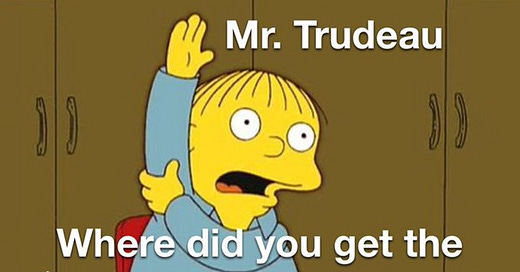“Government is not the solution to our problem…”
“…government is the problem.” – Ronald Reagan
Let’s start with the “good news”
Only works if you’ve watched the show.
Trudeau and his merry gang of incompetents and kleptocrats have decided that Canadians need a break from taxes. Typically, I’m a “never look a gift horse in the mouth” kind of guy and who doesn’t like free money, right? The problem is that after 9 years under the Liberal/NDP regime, my default assumption is that in this case free probably means “free.”
First the details. Beginning December 14th there will be a two month “exemption period on GST from groceries (prepared foods including vegetable trays, pre-made meals, salads and sandwiches,) sit-down and take-out restaurant meals, beer and wine, children’s clothing and toys and diapers.” In addition, those of us who earn less than $150,000 “will also receive a $250 cheque sometime in April 2025.” No sales tax and free money! Sign me up right. Hold on, the devil is in the details (and probably the Liberal cabinet) so, while I keep one hand on my wallet, I have a few questions:
Where’s the money coming from?
Why are you being generous now?
How much will I save on groceries?
The first question is simple, the money is coming from the taxpayer and the bill looks big. The checks are expected to cost the government “about $4.7 billion, while the GST break is expected to cost another $1.6 billion.” The fact that it’s “robbing Peter to pay Paul” partially answers the second question; it’s easy to be generous when you’re using other people’s money. That’s why the Liberals are making so many services “free” after all.
While the government bill will be large, our savings will not be. How much should Canadians expect to save? Michael Smart, an economics professor at the University of Toronto, “estimates that an average family of three in Canada might end up saving about $150 if those taxes come off for two months.” Dr. Sylvain Charlebois, known as “The Food Professor,” on X thinks “Canadians will save an average of $4.51.”
Charlebois has another point, the “temporary GST holiday, set for an 8-week period, is going to be a disaster for grocers. The need to decode and recode systems during their busiest time of year will far outweigh the benefits for Canadians." Then they’ll have to do it all over again in two months.
If you’re any good at budgeting it does raise additional questions; is the government collecting more money than it needs? If so, then why not make the cut permanent? If not, will the government just be clawing it back next year or are they planning on just watching the debt continue to rise? I know what you’re thing, “you’re asking logical questions Phil, you should know better than that.” You’re right, point taken. My error was in assuming that this effort is intended to help Canadians when it’s not. And that gets us to the second reason why this is being done, politics.
The Liberals long ago gave up trying to fix the countries problems and where they’re not importing American tactics – labelling their opponents “far right” and “weird,” and accusing them of wanting to roll back abortion rights, to give three examples – they’ve mostly been focused on bribing voters. The problem is they’re bribing us with our own money.
I just hope most Canadians are smart enough to see this.
What happened to all my junk mail?
For a week now I’ve been surprised by the lack of fliers and other useless junk mail in my mailbox. I didn’t give it much thought until I saw a news story this morning reminding me that the post office is, once again, on strike. I feel for the postal workers, being able to read at a grade school level and walk around must be taxing.
Once upon a time the post office performed a service that only the government can do but today, we have FedEx, UPS, and the ability to send important documents by mail. What’s more, despite the myth that Canada Post adheres to the “rain, nor snow, nor sleet, nor hail shall keep the postmen from their appointed rounds” motto, FedEx is more likely to deliver parcels when it snows than Canada Post. Maybe that’s why FedEx is profitable in Canada while Canada Post lost $748 million in 2023 and is on pace to lose more this year.
That last two strikes (2011 and 2018) were resolved by the government passing back-to-work legislation. I have a better idea; have the government negotiators offer postal workers half of what they’re earning today and if they refuse to end the strike call it a win. You can use the money that would have been wasted on that organization to make the GST rebate permanent. Then you can get on with defunding the CBC.
Is beer more complicated than wine? More volatile?
Time for a little “Canadiana.” Non-Canadian readers may be surprised to hear that alcohol is sold by the government in Canada. Not exclusively and it depends on which province you live in, but roughly 50%-80% of total alcohol sales are controlled by government-run or regulated outlets. In return for allowing the government to control liquor sales they have generously kept sales taxes to a microscopic 20% - 31%. They are truly benevolent! Oh, thank you great leader(s)!
I was recently in Ottawa (Ontario, Canada for you foreigners) and had the opportunity to see how things are done in Ontario. I live in BC and my complaints here are restricted to my favorite Scotch costing 100% more than it did in NY State and that for some reason asking if the wines are sorted alphabetically results the store clerk giving me a look as if to ask, “why would we do that?” Sorry, yes, your system of randomly placing wine throughout the store is a much better system, what was I thinking? Anyway, in Ontario beer is sold at The Beer Store (formerly Brewer’s Retail but after operating under that name for 40 years someone decided the name was too confusing) while cider, spirits, liquor, and sometimes beer is sold at the Liquor Control Board of Ontario (LCBO). With me so far? If you’re already confused, take a deep breath because we’re just getting started. If you wish to purchase something at the liquor store you find it (remember it’s not alphabetical), bring it to the cashier, pay for it, and leave. If you want beer you (probably) go to the Beer Store, go to the guy behind the counter on the left and tell him what you want. He then goes into the back (beer is not kept where you can see it), brings it to the front, and you pay for it over on the right side of the store. A system that makes randomly placing wine throughout the store seem sane by comparison and which has created a job that makes postal carrier look like brain surgery.
Why are consumers allowed to view wine and liquor bottles but not beer? I’m (fairly) sure there was a reason when the system was set up way back in 1927 when The Beer Store was established. Why hasn’t it been changed? That’s much easier to answer, bureaucracy. To paraphrase Thomas Sowell, the goal is to put a system in place, the results are irrelevant. If the results don’t matter, then there’s no reason to improve the system. This is the same reason why there are two separate types of stores and why frequently they’re beside each other in the same mall.
This has been your lesson in government bureaucracy and efficiency. Go forth and punch a bureaucrat. If you can find one. It may be tough since they work from home two days per week and get a lot of vacation.







Deficit spending to buy votes
About your junk mail. Time was, if you were a homeless person down on your luck, or a wino needing a few bucks for a jug of wine, or a new immigrant who didn’t speak English yet, you could always make a few bucks delivering grocery store flyers for 3 cents a pop. Then, Canada Post took over the flyer biz, eliminating all those jobs at the margin. Also, back in the day, I knew a couple old geezers who supplemented their meagre pensions by selling ads to local businesses and printing them in flyers that they hired the local bums to deliver. Now you get ten times the flyers delivered by unionized government employees and all the bums are out of luck. Progress!